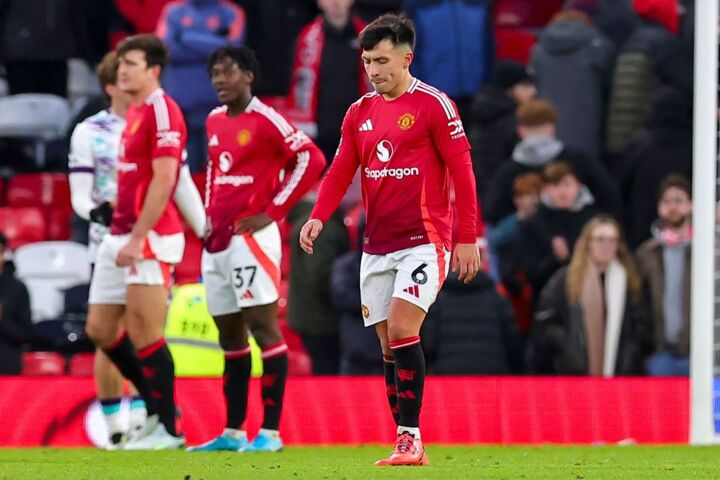There's a reason why the idea of a European super-league has been floated again.
And a reason why England's richest clubs won't deviate a mile from the plan.
That reason is: Manchester United 0 Bournemouth 3.
The fact that the 'smallest' club in the Premier League can crush England's biggest club on home turf, not just in one fluke but in two consecutive seasons, is definitive proof that anything can happen in the richest domestic league in the world world.
Bournemouth, Nottingham Forest and Fulham are promoted together in 2022 and all sit in the top half of the table because they have enough money and competence to build squads with at least two very decent players in each position.
Brighton and Brentford are also above United and approaching the halfway mark of the season.
That torpedoes the idea of 'the rich get richer and the poor get poorer'. Because there are no poor people in the Premier League.
Real Madrid and Barcelona – who back the latest Super League plan – are deeply jealous of the Premier League because it is essentially bloody brilliant.
United and the rest of England's traditional elite are being tempted by a super-league because they can no longer guarantee themselves European football – and because it would make them more money to distance themselves from those well-managed upstart clubs.
I landed on Sunday after a seven-hour flight from the Middle East, during which five Premier League matches had been played.
Two of the results – Tottenham 3 Liverpool 6, and Bournemouth's latest thrashing of United – made me laugh out loud.
And yet it's not even that surprising anymore.
Ange Postecoglou's Spurs have not had a simple, easily predictable result of the highest standard in any domestic match, either positive or negative, since beating Brentford 3-1 on September 21.
Maybe the 4-1 win over West Ham in October – but even that was the crushing of a local rival, with a comeback, a red card and a mass brawl.
And of course it's not just Spurs.
A few weeks ago I half-jokingly predicted that there will be no Champions League football in Manchester next season for the first time in thirty years.
There's nothing vaguely funny about that statement. In fact, it's very likely.
City's phenomenal collapse – one win and nine defeats from 12 games in all competitions – has been analyzed until the cows come home.
But if Real, Barcelona or another European powerhouse had had similar problems to Pep Guardiola's side – major injuries and a squad that has aged rapidly – their results would not have been nearly as bad, as they would have had a comfortable season . profit or two to pick up.
That could prevent the complete collapse of confidence that City have suffered.
Instead, City lost to Bournemouth and Brighton and were drawn to Crystal Palace. Because they're all decent teams.
Before City's horror run, their previous three league games had been one-goal wins over Fulham, Wolves and Southampton.
Fulham had a superior number of 'expected goals' to City at the Etihad. It took a controversial 95th minute winner to beat Wolves.
Guardiola caused much amusement at the time by heaping praise on Russell Martin's Saints after City's 1-0 home win.
Pep was not patronizing. He was serious.
He knew that even the bottom team could visit the champions and cause serious problems.
So even City's 12 games don't represent such a sudden fall off the edge of a cliff. It was coming – because the Premier League is too brilliant.
United's crisis has dragged on for 11 years, but the depths of their fall could not be repeated by the richest clubs in Spain, Germany, Italy, France or anywhere else.
In 55 league games since the start of last season, United have a goal difference of -2.
About a decade ago, England's leading clubs were shielded from such failures by Champions League revenue, leaving them with a significant and meaningful wealth gap over the smaller clubs.
That has now been nullified. The Premier League is so prosperous and so competitive that the biggest clubs need a bigger cushion to protect themselves from their own shortcomings.
That buffer still exists in Europe's other major competitions. But Real, Barcelona and other major continental clubs know that as the global fascination with the Premier League grows, it becomes increasingly gloriously unpredictable.
And so another imaginary super competition.
This one, which was laughably called the Unify League, because the 'Ripping Everything To Shreds League' would sound too obvious, and it would be merit based with promotion and relegation and no automatic membership for the elite.
That makes it more palatable than the previous imaginary European Super League, which England's former 'Big Six' had all joined.
The 96-team Unify League would consist of a Star League, a Gold League, a Blue League and a Union League – making it sound like the whole thing was made up by a bored nine-year-old boy in his bedroom.
And yet it is backed by Real chief Florentino Perez, substantially more powerful than a bored nine-year-old boy in his bedroom.
It's created out of fear and jealousy by those who can't justify why the Premier League is so damn brilliant.
And at some point, whether in this decade or the next, one of these imaginary European super-leagues – perhaps a global super-league involving the Saudis and others – will become a reality.
So for now, enjoy Tottenham's madness, enjoy City's collapse and enjoy United's long-term crisis. Because the Premier League, in all its current glory, is too good to last.
